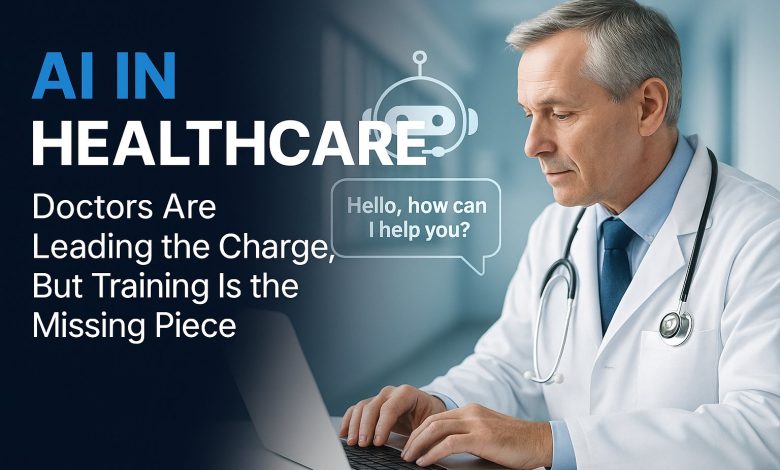
A paradox at the heart of AI adoption
In 2025, one of the most striking lessons about artificial intelligence isn’t coming from Silicon Valley boardrooms, it’s coming from hospital hallways.
Doctors, among the most data-driven professionals in the world, are embracing generative AI tools faster than anyone expected. Yet at the same time, they’re clear-eyed about their own readiness: they know they need more training, more guardrails, and more transparency before AI can fully deliver on its promise in medicine.
This tension, rapid adoption on one hand, urgent calls for support on the other, reveals a blueprint for how all industries should be thinking about AI adoption.
Adoption is bottom-up, not top-down
In our 2025 Clinician AI Readiness Study, which surveyed 500 U.S. physicians across five specialties, the numbers tell a compelling story:
- 88% of doctors are already experimenting with generative AI, most commonly ChatGPT, CoPilot, Gemini, and Med-PaLM.
- Everyday uses include researching medical information (64%), clinical documentation (63%), and ambient listening tools (54%).
- Specialty adoption is already underway: oncologists are testing AI in genomics, cardiologists in remote patient monitoring, and pulmonologists even in surgical contexts.
These findings highlight an important truth: adoption is happening bottom-up. Clinicians aren’t waiting for hospital systems or regulators to bless these tools; they’re testing and applying them directly in their workflows.
For C-suite leaders across industries, this is a wake-up call. Employees will not stand by while leadership debates policies, they’ll adopt AI if it makes their jobs easier. The question is whether organizations will be ready to support and shape that adoption.
The readiness gap
Here’s where the paradox sharpens. Despite widespread experimentation, most doctors do not feel ready for the AI-driven future:
- 61% say they will need retraining because of AI.
- 55% expect their roles to change significantly.
- And only 1 in 5 feel prepared to integrate AI safely and effectively into clinical care.
This “readiness gap” is not unique to healthcare. It’s the same dynamic that will play out in finance, logistics, retail, and manufacturing: employees racing ahead with tools that work, while organizations lag in building the training, workflows, and safeguards to support them.
Why trust matters as much as accuracy
One of the most striking findings from our study is that physicians are optimistic about AI’s potential, but cautious about trust.
Doctors see the upside:
- 73% believe AI can save them time.
- 66% say it can enable more personalized treatment.
- 64% expect it to help identify patterns earlier.
But optimism is balanced with caution. Many clinicians worry about accuracy, transparency, and liability. They want tools that are explainable and interpretable, not black boxes.
The broader implication is clear: trust is the currency of AI adoption. Without it, even the most powerful models will stall in real-world use.
A workforce in transformation, not replacement
Perhaps the most misunderstood aspect of AI in healthcare, and across industries, is the idea of replacement. Our study suggests a more nuanced reality:
AI is not replacing doctors. But it is redefining their roles.
- Less time on paperwork, more time on patients.
- New skills around documentation, AI safety, and workflow integration.
- Continuous retraining as a norm, “back to school” moments throughout a career.
In other words, AI is driving workforce transformation, not substitution. The leaders who recognize this shift, and invest in retraining, will be the ones who unlock AI’s true potential.
Lessons for every industry
Healthcare may be unique in its stakes, but it is not unique in its challenges. What we’re seeing with doctors in 2025 offers a glimpse of what every sector will face:
- Adoption will outpace readiness. Employees will use tools before leaders are ready.
- Trust and transparency are as critical as performance. Without them, adoption won’t stick.
- Continuous retraining will be essential. Workforces won’t just be reskilled once, they’ll need ongoing transformation.
The healthcare AI market is projected to reach $110 billion by 2030. But the real story isn’t the market size, it’s whether the humans who use these tools feel ready to embrace them.
Final thought
Doctors are showing us the paradox of AI adoption: enthusiasm and optimism balanced with pragmatism and caution. They are embracing the tools, but they’re also sounding the alarm that adoption without training and trust will not succeed.
That’s not a sign of resistance. It’s a sign of wisdom. And it’s a lesson every industry should pay attention to.


